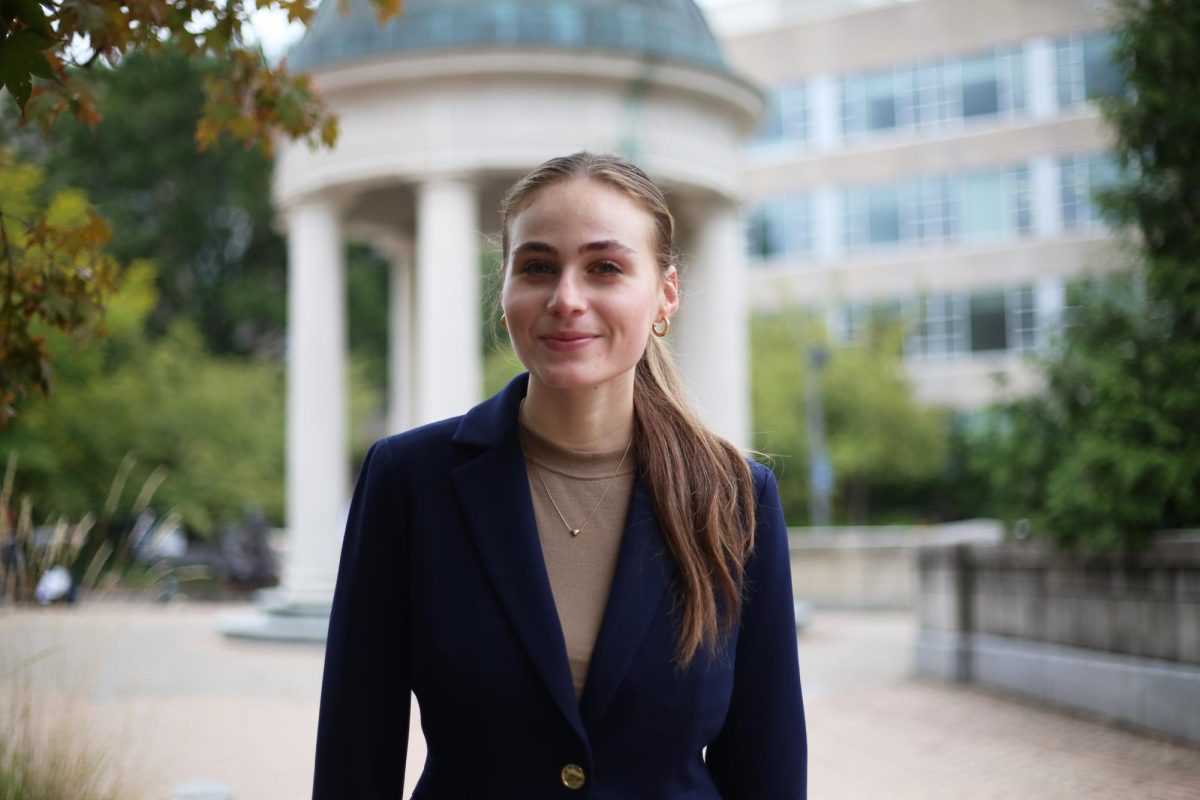A student group that launched in August is aiming to reduce food waste from restaurants and food insecurity on campus by distributing free food at pop-up events.
Sharing Excess GWU, a campus chapter of a national organization based in Philadelphia, plans to distribute excess food donated by local restaurants and stores to students for free. Junior Ashleigh Sorokin, the chapter’s founder, said the pop-up events are inspired by the app Too Good To Go — which restaurants use to sell fresh, leftover meals from vendors at discounted prices.
Sorokin, a public health student, said the group has set a goal to distribute free food through a pop-up event by the end of October. She said the group in August began reaching out to about 20 Foggy Bottom stores and restaurants, like Bullfrog Bagels, SecreTea, Call Your Mother and Trader Joe’s to gather excess food and have since received “positive” responses but no partnering businesses have been confirmed.
Once they secure excess food donations, student volunteers plan to walk around campus with baskets of food and encouraging people to take items as they pass by, she said.
“We’re really focusing on bringing this food access to the GW community and bringing everyone together around this idea, rather than donating the food to food kitchens and food pantries in the area,” Sorokin said.
Sharing Excess has 16 student chapters in colleges throughout the northeastern region of the U.S. including Georgetown University, according to the organization’s website. Sorokin said as the club grows, she plans to register the group as an official student organization next semester.
Sorokin said the group will post signs around campus to announce food distribution days. She said it would not be feasible for the group to rent a table in Kogan Plaza for distribution because members won’t know in advance when a restaurant has excess food available.
Sorokin said Sharing Excess GWU will distribute the food items that it gets from vendors like perishable baked goods, fresh produce and premade goods, like sandwiches and bagels, to students the same day they are received.
“We’re just really waiting to hear back when they have that food available that would need to be distributed,” Sorokin said.
Sorokin said the group is focused on spreading awareness about their mission this semester through word of mouth and posters with QR codes linking to its Instagram around campus. The group had its first general body meeting late last month, and she estimated that the organization has about five students involved members.
Sorokin said she was inspired to start the group after interning for Sharing Excess this summer with their community engagement team. One month into her internship in July, Sorokin said she got the idea to ask her boss about starting a chapter at GW.
“I asked the development director if that would be a good idea, and she was like, ‘Yes, of course, go for it,’” Sorokin said.
Sorokin said she was also meeting with the GW Food Recovery Network this week — an organization that donates leftover food to homeless shelters and donation centers around D.C. — to discuss holding joint events since both organizations work toward reducing food waste.
Sorokin said she has reached out to a variety of student organizations, like certain club sports and The Store — a food pantry for students located in District House — to establish relationships and hopes to collaborate with other student organizations in the future. She added that Sharing Excess GWU may be able to donate excess food from their distributions to The Store to ensure that no food goes to waste.
“We’re really trying to broaden our network and get new members and get everyone involved and be a part of the GW community,” she said.
Fifty-six percent of GW students reported feeling food insecure in the 2022-23 academic year, according to the GW Capital Peers Nutrition Initiative, an organization that educates students to engage in positive health practices.
Nourhan Ibrahim, the development director for Sharing Excess, said the student chapters play a “vital” role in the organization’s mission because the chapters redistribute the surplus food “quickly and efficiently” to community members.
“Through events, campaigns, and outreach, they inspire others to join the fight against food waste while fostering a culture of sustainability and destigmatizing food-sharing on campus,” Ibrahim said in an email.
Ibrahim said Sharing Excess provides “comprehensive” food safety training to all volunteers and chapter members that includes information on refrigeration guidelines when transporting the items, the types of food to accept or decline and visual examples of what to look out for in perishable foods.
Ava Hurley, a junior and the president of the GW Food Recovery Network, said she is looking forward to collaborating with Sorokin on their combined mission of addressing food insecurity. Hurley said her organization focuses on donating unused foods to local food banks, while Sharing Excess which focuses on distributing leftover food from local businesses to students.
“It’ll be really good for us to be able to collaborate and make sure that more wasted food is actually being discovered and actually going somewhere instead of just becoming waste,” Hurley said.
Hurley said she is excited about having a larger group of people on campus who are passionate about reducing food waste and insecurity.
“We can pull our resources together at events and other things where there is food waste and be able to work together toward recovering it and making sure it does get eaten,” Hurley said.
Senior Ben Jacobs, an international business major and member of the group, said the informal nature of how the group will hand out food will make it more appealing to students.
“The casual setting that all the pop-ups are, I think that’s more comfortable for everybody,” Jacobs said. “It makes it less transactional.”




